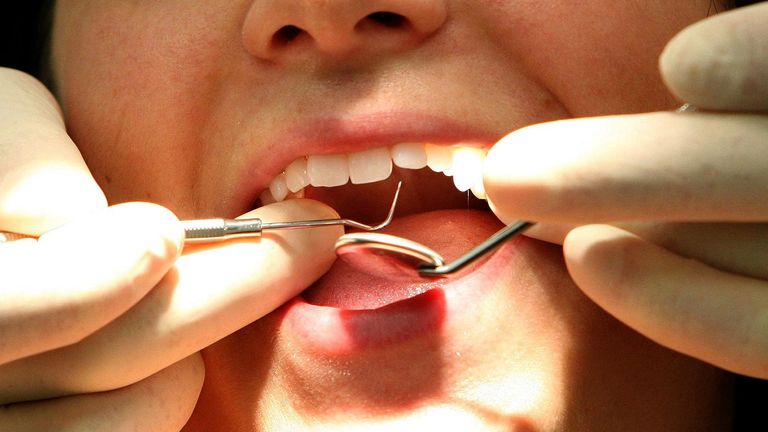Enamel regeneration breakthrough could end tooth decay agony, scientists say
Researchers say they can trigger the growth of crystals in an "exciting" breakthrough that could help protect people's teeth.
Sunday 3 June 2018 14:41, UK
Scientists claim they have developed a material that could help regenerate tooth enamel to prevent decay and sensitivity.
Enamel, the outer coating of the teeth, is the hardest tissue in the body and can resist extreme temperatures and acidic food and drinks.
But unlike other tissues it cannot regrow, leading to pain and tooth loss for roughly 50% of the world's population.
Researchers at Queen Mary University of London say they have developed a way to grow mineralised material, paving the way for regenerating hard tissues such as enamel and bone.
The team found a protein that is able to trigger the growth of crystals, in a similar way to how crystals grow when dental enamel develops in the body.
The experts believe their work, published in science journal Nature Communications, has the potential to be used in a variety of ways in regenerative medicine.
Dr Sherif Elsharkawy, a dentist and co-author of the study, said: "This is exciting because the simplicity and versatility of the mineralisation platform opens up opportunities to treat and regenerate dental tissues.
"For example, we could develop acid-resistant bandages that can infiltrate, mineralise, and shield exposed dentinal tubules (microscopic channels) in human teeth for the treatment of hypersensitivity."
Lead author Professor Alvaro Mata said the "key discovery" had been finding a way to exploit proteins to control and guide the process of mineralisation.
He added: "Through this, we have developed a technique to easily grow synthetic materials that emulate such hierarchically organised architecture over large areas and with the capacity to tune their properties."
The findings come months after it was reported that children and teenagers had almost 43,000 "completely preventable" NHS operations to remove rotting teeth in 2017.
Analysis of NHS spending data by the Local Government Association found that £36.2m was spent on 42,911 extractions for under-18s in 2016/17, which equates to 170 operations a day.




